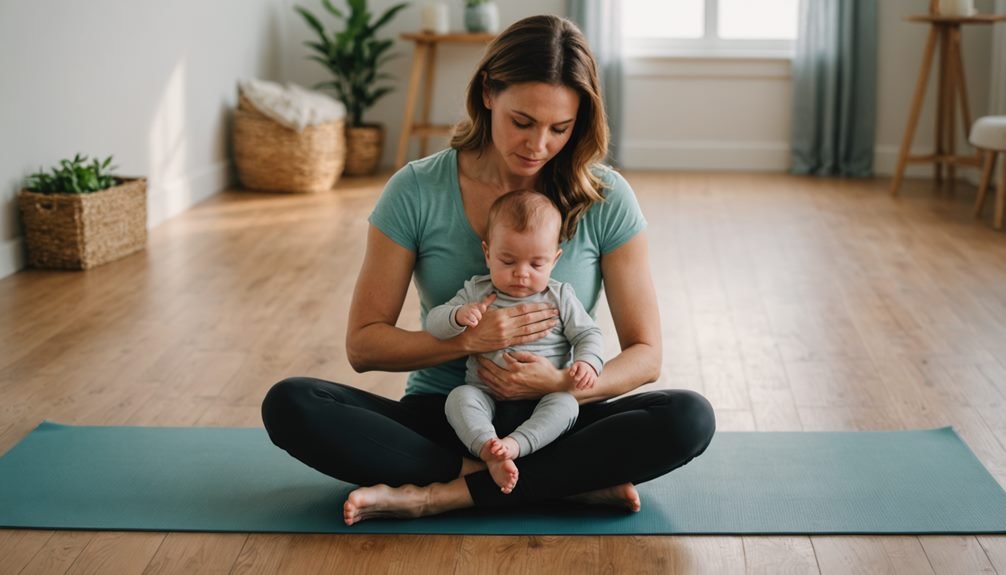"Cherishing Little Steps - A Haven for Baby and Family Journeys"
Daily Habits for Postpartum Mental Wellness
Imagine a day where your mental well-being is nurtured through simple yet powerful daily habits. Each morning, you wake up with a sense of purpose, ready to embrace the day ahead. As you go about your routine, you find moments of peace in mindful breathing exercises and gratitude journaling. But these are just the beginning. The journey to postpartum mental wellness is multifaceted and filled with opportunities for growth and self-discovery.
Mindful Breathing

When it comes to postpartum mental wellness, practicing mindful breathing can be a powerful tool for finding calm and centering yourself during this transitional period. Incorporating meditation techniques into your daily routine can help manage stress and promote a sense of peace. Taking a few moments each day to focus on your breath can make a significant difference in how you navigate the challenges of postpartum life.
Engaging in mindful breathing involves paying attention to each inhale and exhale, allowing yourself to be fully present in the moment. This practice can help you release tension, reduce anxiety, and improve your overall mental well-being. By breathing deeply and intentionally, you create space for relaxation and inner peace to flourish.
As you navigate the ups and downs of postpartum life, remember that mindful breathing is a simple yet effective way to support your mental wellness. By incorporating meditation techniques and stress management strategies into your daily routine, you can cultivate a sense of calm and resilience that will serve you well during this transformative period.
Gratitude Journaling
Engaging in gratitude journaling can be a transformative practice that nurtures your mental well-being during the postpartum period. Taking a few moments each day to reflect on things you're grateful for can have a profound impact on your overall mood and outlook. Start by jotting down positive affirmations, such as moments of joy with your newborn, acts of kindness from loved ones, or even small achievements in your day. This practice can help shift your focus towards the positive aspects of your life, promoting a sense of gratitude and contentment.
Incorporating gratitude journaling into your self-care rituals can provide a moment of solace amidst the challenges of postpartum life. Carving out this time for reflection can serve as a form of therapy, allowing you to acknowledge and appreciate the good, no matter how small it may seem.
Gentle Movement

Amidst the challenges of the postpartum period, incorporating gentle movement into your daily routine can play a crucial role in supporting your physical and mental well-being. Engaging in activities like yoga practice and nature walks can help you reconnect with your body and mind, promoting overall wellness during this transformative time.
—
| Benefits of Gentle Movement | Description | Impact |
|---|---|---|
| Yoga Practice | Through gentle yoga poses and breathing exercises, you can increase flexibility, reduce stress, and enhance relaxation. | Boosts mood, improves sleep quality, and aids in postpartum recovery. |
| Nature Walks | Taking leisurely walks in nature allows you to soak in fresh air, sunlight, and the calming sounds of the outdoors. | Reduces anxiety, promotes bonding with your baby, and enhances your overall well-being. |
—
Balanced Nutrition
Ensuring balanced nutrition is fundamental to supporting your physical recovery and mental well-being during the postpartum period. Meal planning can be a lifesaver during this time. Prepare easy, nourishing meals in advance to save time and ensure you're getting the nutrients you need.
Include a good balance of protein, healthy fats, complex carbohydrates, and plenty of fruits and vegetables to fuel your body and mind.
Hydration is also key to feeling your best postpartum. Remember to drink plenty of water throughout the day to stay hydrated and aid in recovery. Keep a water bottle handy wherever you're to remind yourself to sip regularly.
Incorporating these simple habits into your daily routine can make a big difference in how you feel physically and mentally as you navigate the postpartum period. Prioritizing balanced nutrition and staying hydrated will help you replenish your body after childbirth and support your mental wellness.
Social Connection

Navigating the postpartum period involves more than just physical recovery; your mental well-being is equally important. Social connection plays a crucial role in maintaining your mental wellness during this time of adjustment. Building a support system through virtual meetups, joining mom groups, or accessing online therapy and support groups can provide you with the necessary emotional support and understanding.
Consider the following ways to enhance your social connection:
| Virtual Meetups | Mom Groups | Online Therapy |
|---|---|---|
| Connect with other moms facing similar challenges | Share experiences and tips with like-minded individuals | Access professional help from the comfort of your home |
| Combat feelings of isolation and loneliness | Receive emotional support and validation | Participate in therapy sessions tailored to your needs |
| Foster friendships and camaraderie | Build a strong sense of community | Discuss your feelings and concerns openly |
Prioritizing social connections can help you feel supported, understood, and less alone during your postpartum journey.
Adequate Rest
During the postpartum period, prioritizing adequate rest is essential for your physical and mental well-being. Sleep hygiene plays a crucial role in helping you feel more refreshed and ready to tackle the demands of caring for your newborn. Establishing a nap routine can be beneficial in combating sleep deprivation and promoting better overall rest. Remember to create a comfortable and relaxing sleep environment, free from distractions. Incorporating relaxation techniques, such as deep breathing exercises or gentle stretches before bed, can help calm your mind and prepare your body for restful sleep.
Self-care isn't selfish; it's necessary for your well-being during this challenging time. Make time for yourself to unwind and recharge. Allow yourself to take naps when your baby sleeps or ask for help from your support system to ensure you get the rest you need.
Prioritizing adequate rest is a powerful act of self-love that will benefit both you and your baby in the postpartum journey.
Emotional Check-ins

For new mothers, staying attuned to your emotional well-being is crucial during the postpartum period. It's normal to experience a range of emotions during this time, so taking care of your mental health is essential. Here are some tips for emotional check-ins:
- Self-care routines: Establishing regular self-care practices can help you manage stress and maintain emotional balance.
- Emotional well-being: Acknowledge your feelings without judgment and seek support if needed. Talking to a therapist or joining a support group can provide valuable insights.
- Mindfulness exercises: Engaging in mindfulness activities such as deep breathing or meditation can help you stay present and calm during emotionally challenging moments.
- Journaling: Writing down your thoughts and emotions can be a cathartic way to process your feelings and gain clarity on your mental state.
Creative Outlets
Amidst the whirlwind of new motherhood, finding outlets for creativity can serve as a valuable form of self-expression and stress relief. Engaging in creative activities like art therapy, DIY crafts, music therapy, or writing prompts can provide a much-needed break from the demands of caring for a newborn. These outlets not only allow you to express yourself but also help in processing any overwhelming emotions you may be experiencing during this postpartum period.
| Creative Outlets | Benefits | Examples |
|---|---|---|
| Art Therapy | Promotes relaxation and self-expression | Painting, drawing, coloring books |
| DIY Crafts | Encourages a sense of accomplishment | Knitting, scrapbooking, pottery |
| Music Therapy | Soothes the mind and reduces anxiety | Singing, playing an instrument |
| Writing Prompts | Stimulates creativity and reflection | Journaling, poetry, storytelling |
Taking time for these creative pursuits can be a form of self-care that allows you to recharge and reconnect with yourself amidst the beautiful chaos of motherhood.
Setting Boundaries

Are you struggling to find a balance between caring for your newborn and taking care of your own well-being? Setting boundaries is crucial for maintaining your mental wellness during the postpartum period. Here are some tips to help you navigate this challenging but essential aspect of self-care:
- Communicate openly: Clearly express your needs to your partner, family, and friends. Let them know when you need personal space or time for yourself.
- Establish a routine: Create a schedule that allows you to balance caregiving responsibilities with self-care activities. Effective time management can help you prioritize your well-being.
- Learn to say no: It's okay to decline additional responsibilities or visits if they're overwhelming. Setting limits is necessary for protecting your personal space.
- Protect your alone time: Designate moments for solitude where you can recharge and focus on your mental health. Personal space is vital for regaining energy and clarity.
Professional Support
Struggling with the demands of new motherhood can take a toll on your mental health. Seeking professional support is crucial during this challenging period. Therapist sessions can provide you with a safe space to explore your emotions, fears, and uncertainties. Counseling services offer tools and coping strategies tailored to your specific needs, helping you navigate the complexities of postpartum experiences. Support groups can connect you with other mothers facing similar struggles, fostering a sense of community and understanding.
Peer support is invaluable in reminding you that you aren't alone in this journey. Sharing your thoughts and feelings with others who can relate can be incredibly validating and comforting.
Through group discussions and shared experiences, you can gain insights and perspectives that may offer solace and guidance.
Frequently Asked Questions
Can Postpartum Mental Wellness Practices Be Harmful if Overdone?
When taking care of your mental wellness postpartum, it's important to find a balance in your self-care practices. Overdoing certain wellness habits can potentially lead to negative outcomes. Setting boundaries and being mindful of your limits is crucial.
Prioritize activities that truly nourish your mental health without causing harm. Remember, moderation is key in creating a sustainable and beneficial routine for your postpartum well-being.
How Can Partners Support Mental Wellness Postpartum?
You can support mental wellness postpartum by prioritizing open communication, providing emotional support, offering practical assistance, and establishing healthy boundaries.
Listening without judgment, offering a helping hand with household tasks, and encouraging self-care can make a significant impact.
Are There Specific Foods to Avoid for Postpartum Mental Health?
Avoiding highly processed foods, excessive caffeine, and sugary treats can benefit your postpartum mental health. Research suggests that a balanced diet rich in fruits, vegetables, whole grains, and lean proteins can positively impact your emotional well-being.
While the occasional indulgence is okay, strive for nutritious choices to support your overall wellness. Remember, what you eat can have a powerful effect on your mood and energy levels. Embrace the power of food for a healthier mind.
What if I Struggle to Find Time for Self-Care as a New Parent?
Finding time for self-care as a new parent can be tough. Prioritize by managing your time effectively. Balancing responsibilities is key to nurturing your mental health. Make small moments count – a quick walk, deep breaths, or a warm bath.
Seek support from loved ones to carve out time for yourself. Remember, self-care isn't selfish; it's necessary for your well-being. Embrace these moments to recharge and find balance amidst the chaos of parenthood.
How Do You Know When It's Time to Seek Professional Support?
When it feels like a storm brewing within, warning signs like persistent sadness or anxiety might signal the need for professional support.
Self-care is crucial, but finding a balance can be tough. You deserve the help you need to navigate these feelings.
Seeking support doesn't mean weakness; it's a brave step toward healing. Remember, your mental wellness matters, and reaching out is a powerful act of self-love.
Conclusion
As you continue to incorporate these daily habits for postpartum mental wellness, remember that you are not alone in this journey. By taking small steps each day, you are actively investing in your well-being and creating a positive impact on your mental health. Trust in the power of these simple practices to guide you towards a place of peace and balance. You've got this!




